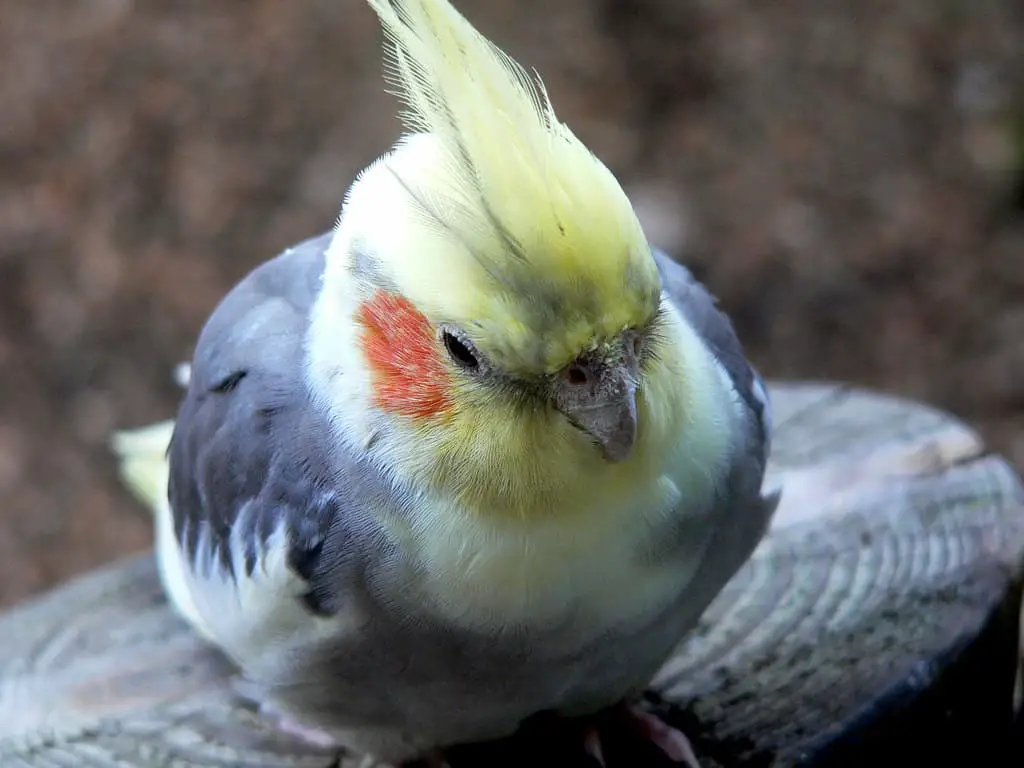As a concerned cockatiel owner, it’s essential to be aware of your bird’s health – and one of the most telling signs is the state of their droppings. You may find yourself asking the question, “Why is my cockatiels poop watery?” – and with good reason. Watery poop can indicate potential problems that may be affecting your beloved pet, and it’s important to recognize these warning signs and act accordingly.
This article will discuss the possible causes for watery poop in your cockatiel, from diet changes to more severe health issues such as parrot fever and kidney disease. We will also touch upon what normal cockatiel poop should look like, helping you determine which changes in your bird’s droppings are cause for concern and when you should consult an avian vet immediately. After all, understanding the nuances of bird poop – especially a cockatiel’s poop – is an essential part of ensuring their health and happiness.
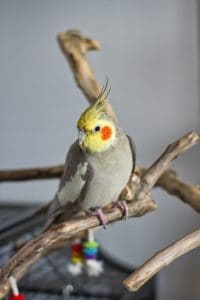
Why Is My Cockatiels Poop Watery?
The most common cause is a sudden change in your cockatiel’s diet; it can also be caused by your bird’s anxiety over a change in his environment. Diarrhea can also be an indicator of a more severe health condition, therefore you should never underestimate its abrupt onset. In any case, whether it persists beyond 24 hours or not, you should contact your veterinarian immediately.
If your cockatiel is ill, it’s critical to find out what is causing it as soon as possible. In general, detecting diarrhea in birds might be tough because their waste is generally quite watery owing to its high bird’s urine content. As a result, you may not immediately realize that your bird isn’t well. You can cure diarrhea and the underlying causes quickly and effectively if you examine his feces on a regular basis for other symptoms of illness, get expert care, and use antibiotics appropriately.
What Are Abnormal Droppings in Cockatiels?
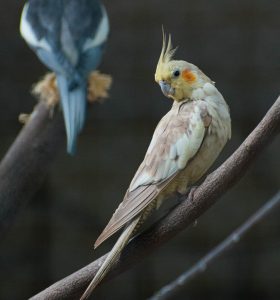
If a cockatiel has diarrhea, its green droppings will be a combination of urate and urine. If your bird only has a day’s worth of loose droppings, it’s possible that he just ate too much. It isn’t always an emergency if your bird produces watery feces for more than 24 hours. However, if you see watery feces for more than 24 hours, you must visit your veterinarian immediately.
Important: It’s important to know the difference between diarrhea and polyuria. The latter is an increase in urine, not always because of illness but sometimes from eating too many fruits or a cockatiel absorbing lots of water.
What Causes Diarrhea in Cockatiels?
Diarrhea and constipation in pet birds are not two separate illnesses, but instead symptoms of a more general digestive issue. This problem could be linked to psychological, nutritional, or pathological origins.
Depending on the illness that afflicted your cockatiel, your veterinarian may prescribe variety of therapies, including dietary modifications, drug therapy, and antibiotics.
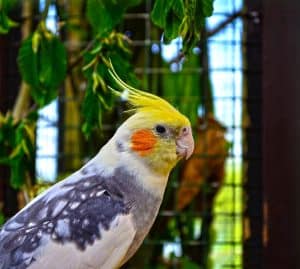
How to Treat Diarrhea in Cockatiels
The following are recommendations to avoid serious complications and treat diarrhea for your cockatiel.
Observe the Behavior of Your Cockatiel
Check your bird’s physical or behavioral signs closely for any additional indications of sick birds, such as drooping wings or lethargy. The following symptoms suggest that your cockatiel is sick:
- He is lethargic and drained of energy
- He isn’t chirping any longer.
- Its feathers are not preened by him.
Avoid Sudden Changes in His Diet
A good diet for your cockatiel consists of the pellets and seeds he is used to. If you need to change his diet, do so gradually. Your vet may also recommend giving him probiotics, which will help with diarrhea and strengthen his digestive tract system.
Provide Your Cockatiel with Fresh, Clean Water Every Day
Make sure your cockatiel is getting enough water. Because dehydration can be fatal if not treated promptly, this is a good idea. If your pet is curled up in the rear of its cage and isn’t drinking and appears to be lethargic, see your veterinarian right away which can help in eliminating parasitic infections. Following additional tests, he will establish a rehydration plan and therapy regimen for the afflicted bird.
Eliminate Potential Sources of Stress
Place your cockatiel in a peaceful room where the temperature is comfortable, away from any loud noises that might be present in other areas of your home that can cause cockatiel diarrhea.
Do Daily Cleanings of Your Bird’s Cage and Accessories
Bacteria or fungal infections can spread quickly, so it’s important to clean your cage and accessories (toys, bowls, perch, etc.) regularly. To do so, wash everything in hot soapy water before rinsing with clean water. Be sure to let everything dry completely before placing the items back in the cage.
Is Cockatiel Poop Toxic to Humans?
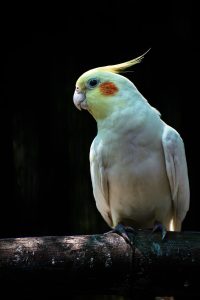
You care about your bird’s health but you also care about yours. Is it feasible for a disease to be transmitted via the excrement of your cockatiel? Yes, though this is not very common; psittacosis is the term for this condition.
What is psittacosis?
Pneumonia caused by Chlamydia psittaci is an infectious disease marked by symptoms that are similar to those of the flu. They are, however, generally minor.
What are the signs of infection in birds?
Parrots, cockatiels, parakeets, macaws, canaries, pigeons, chickens, ducks, and turkeys are all susceptible to the disease. Birds infected with this sickness experience the following symptoms: drowsiness, tremors, weight loss
Infected birds may not display any symptoms for a while, but the bacterial infections causing the disease can be spread through secretions and droppings. Birds can remain infectious for several months.
What are the signs of infection in humans?
The parasitic infections intensity varies depending on the person, from a light flu-like illness to more serious pneumonia. Generally, symptoms become present four to 15 days after being exposed to bacteria.
- Fevers
- Shivering
- Cough
- Fatigue
How do you recognize and treat psittacosis?
Your doctor must know that your cockatiel has been infected with Chlamydia psittaci in order to diagnose psittacosis correctly. The bacteria can be detected, and the disease’s symptoms can be identified through laboratory tests. Also, this condition is responsive to specific antibiotic medication.
Final Thoughts on Why Is My Cockatiels Poop Watery
In a nutshell, if you follow the advice above in addition to treatment and guidance from your veterinarian, you should be able to avoid recurring diarrhea and keep a healthy bird. Make certain that your cockatiel’s living environment is adequate. Feed it high-quality food at all times and keep its habitat clean. Avoid making rapid changes to minimize any needless stress on your pet bird, and remove any potentially toxic objects from its surroundings.
- Why Is My Cockatiels Poop Watery
- Why Is My Cockatiel Vomiting
- Why Is My Cockatiel So Quiet
- Why Is My Cockatiel Shaking
- Why Is My Cockatiel Losing Feathers
- Why Is My Cockatiel Laying Eggs On Bottom Of Cage
- Why Is My Cockatiel Eating So Much
- Why Is My Cockatiel Chirping So Much
- Why Does My Cockatiel Scream When I Leave The Room
- Why Does My Cockatiel Nibble Me
- Why Does My Cockatiel Keep Yawning
- Why Does My Cockatiel Hang Upside Down
- Why Does My Cockatiel Fly On My Head
- Why Does My Cockatiel Face The Wall 6 Reasons
- Why Does My Cockatiel Bob His Head
- Why Does A Cockatiel Stand On One Leg
- Why Do Cockatiels Sing
- Why Do Cockatiels Hiss
- Why Do Cockatiels Have Crests
- Why Do Cockatiels Eat Their Poop
- Why Do Birds Rub Their Beaks
- Why Do Birds Poop In Their Water
- Why Cockatiels Like Head Scratches
- Why Cockatiels Grind Their Beaks
- Why Choose A Cockatiel Bird As A Pet
- Why Are My Cockatiels Tail Feathers Falling Out
- Why Are My Cockatiels Fighting
- Why Are My Cockatiels Feet Warm
- Why Are Cockatiels So Dusty
